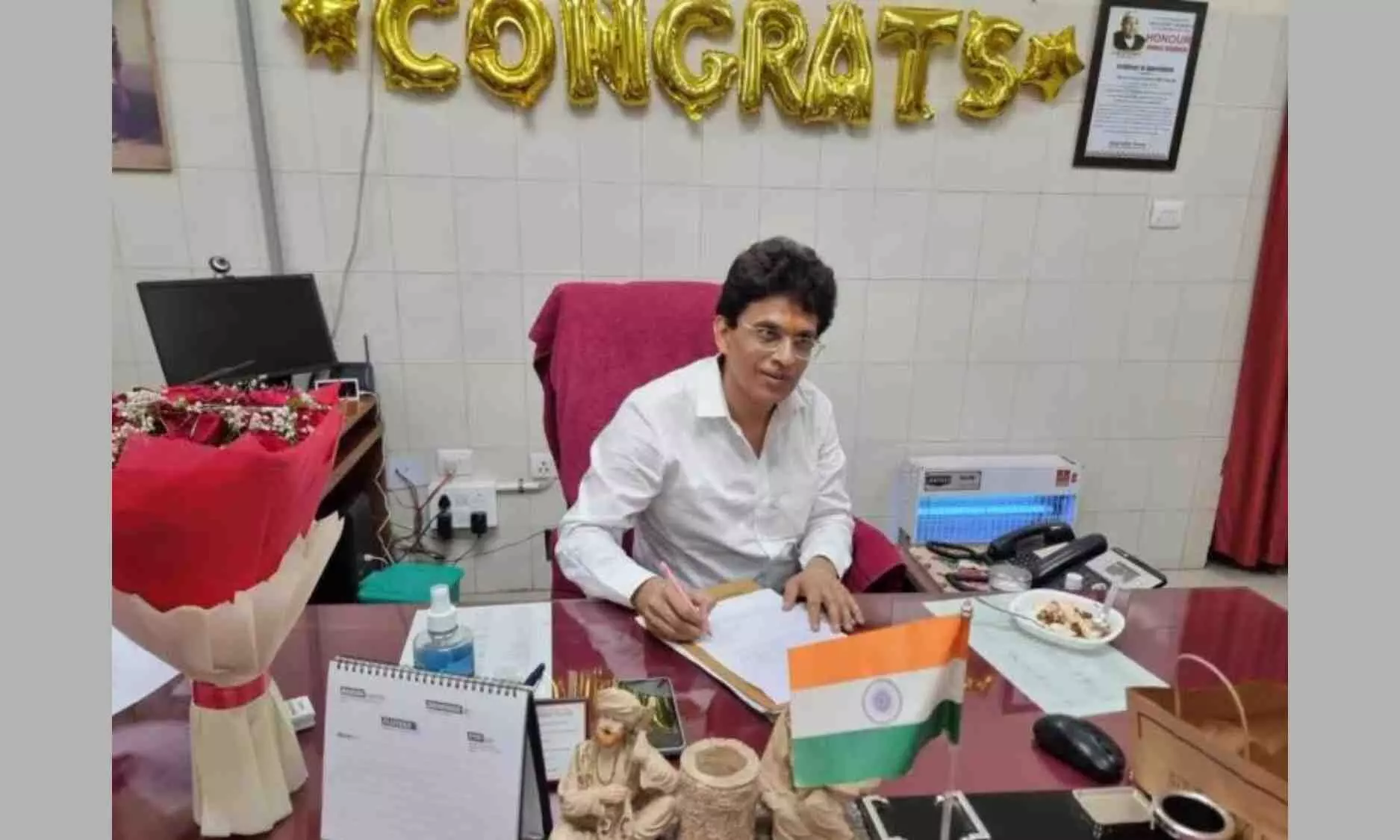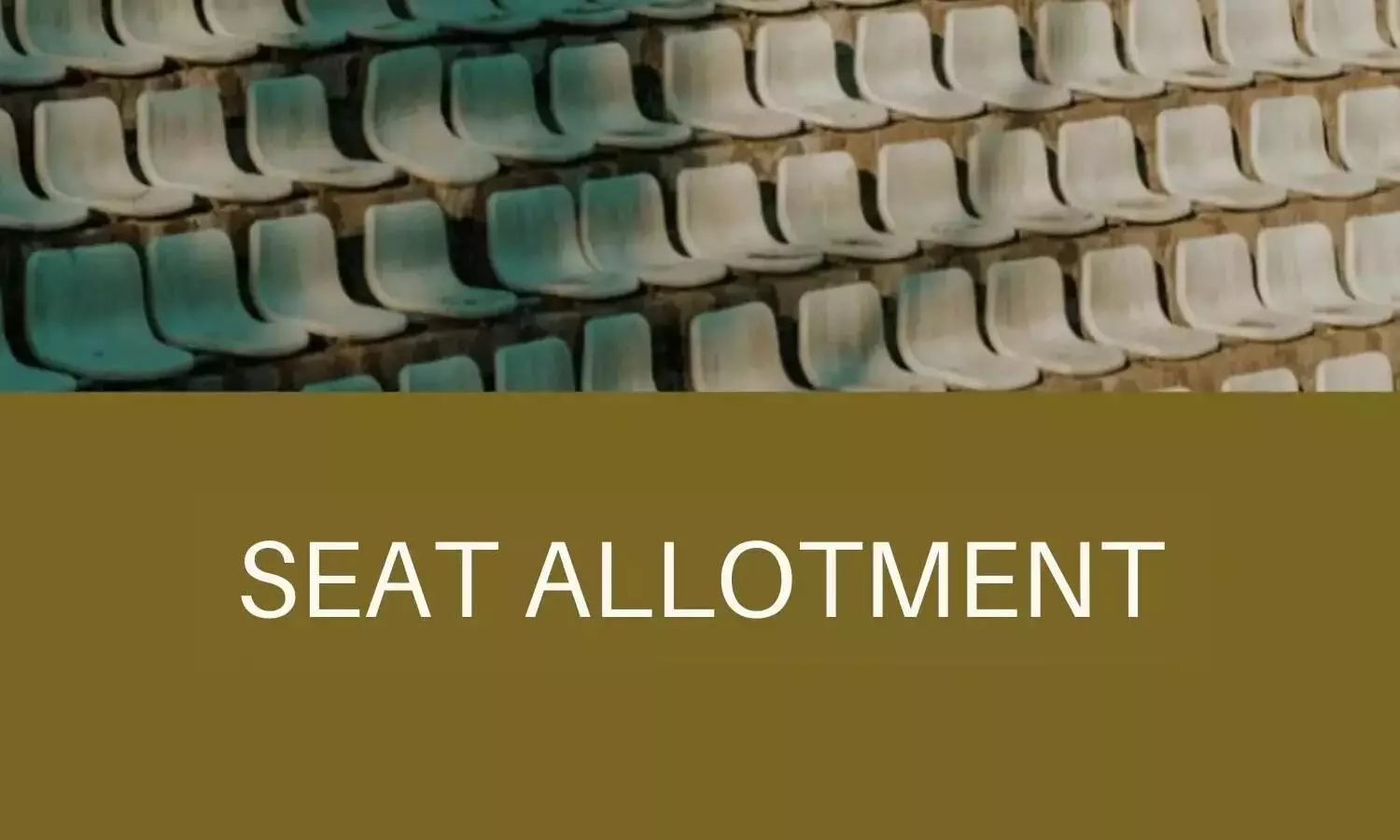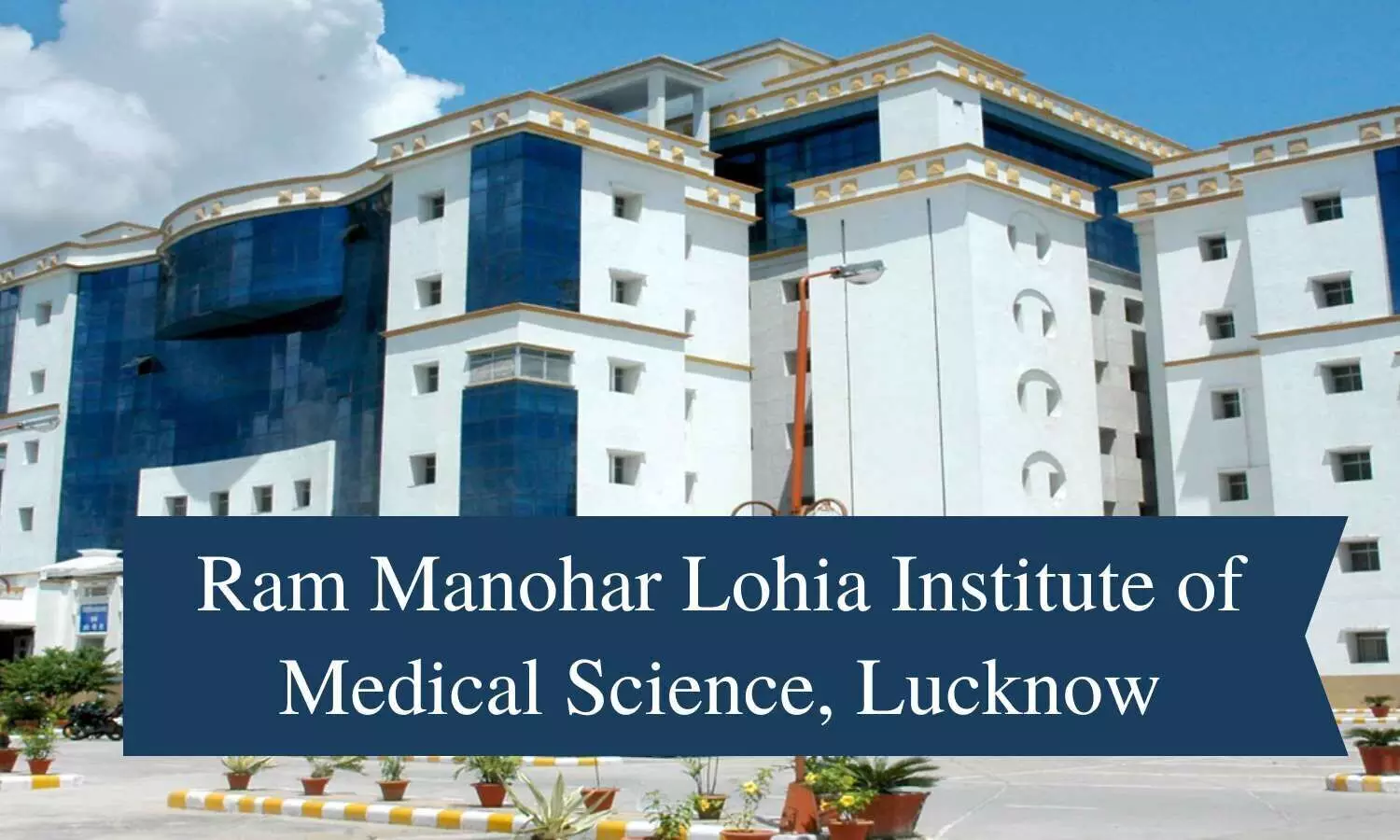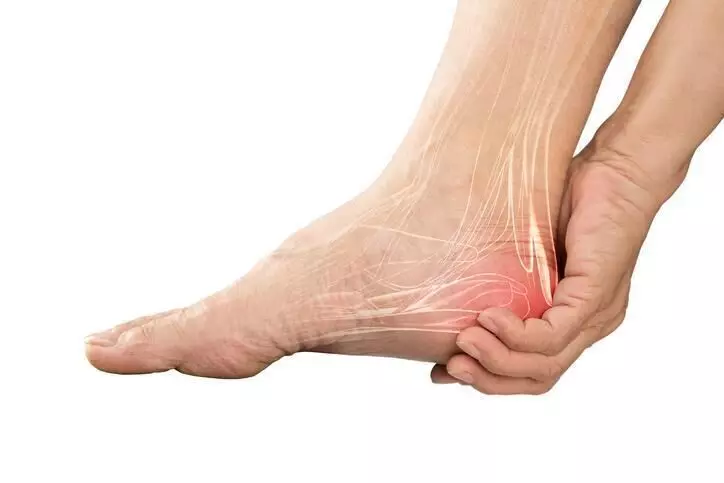New insights into metabolic and immune pathway interactions in obesity
Powered by WPeMatico
Powered by WPeMatico
Powered by WPeMatico
Powered by WPeMatico

Patiala: Professor and Head of the Department of Orthopaedics, Dr Girish Sahni has been appointed as the new medical superintendent of Government Rajindra Hospital in Patiala.
The Department of Medical Education on Thursday gave Dr Girish the charge after the former medical superintendent Dr Harman Singh Reikhi resigned from the position citing health issues on June 8, 2024.
Afterwards, the hospital authorities made significant attempts to find a replacement for the position. It was reported that many senior doctors were asked by health department authorities to take on the role of MS, but most of them turned it down.
Also read- Dr Anita Vig Kohli Appointed As New HOD Anaesthesiology At GMC Jammu
Speaking to HT, Dr Girish Sahni said, “The priority is to provide the best possible healthcare facilities to the patients. The issue of availability of medicines will be resolved and the process to procure medicines will be streamlined.”
Further, he told Royal Patiala, “I will ensure to further uplift the health facilities to the poor and needy patients coming to Rajindra Hospital. I am committed to carrying on the drive for upgrading health infrastructure initiated by Chief Minister Bhagwant Singh Mann and Health Minister Dr Balbir Singh.
As per reports, the Director Principal of GMC Patiala and Rajindra Hospital, Dr Rajan Singla, on Wednesday resigned from his post citing health reasons.
Sharing the news on popular social media platform ‘X’, Amrinder Singh Raja Warring, member of the parliament said “Concerned over the recent Developments at Rajindra Hospital Patiala. The College principal & medical superintendent have resigned within a gap of a few days which sniffs of some @AAPPunjab govt I’ll-treatment. This govt has a history of such acts, previously their HM had misbehaved with world-renowned Dr. Raj Bahadur who had then resigned as VC Baba Farid University.”
Also read- Padma Shri Dr Mahesh Verma Reappointed As Vice Chancellor Of GGSIP University
Powered by WPeMatico

New Delhi- All India Institute of Medical Sciences (AIIMS) has begun the online seat allotment process for the AIIMS BSc Nursing Hons course for the August 2024 session.
As per the schedule, the 1st round of online seat allotment has begun and the entire process will continue till July 18, 2024 at 05.00 PM. The second round of online seat allocation will start from July 25, 2024, after the completion of the first round and the entire process will continue till 31 July 2024 till 05.00 pm.
|
S.NO |
EVENTS |
DATES |
|
1 |
Exercising of Choices (AIIMS) for 1st Round. |
05.07.2024 (Friday) to 09.07.2024 up to 05.00 pm (Tuesday). |
|
2 |
Announcement of seat allocation of 1st Round. |
12.07.2024 (Friday). |
|
3 |
Online Acceptance of allocated seat. |
13.07.2024 (Saturday, 01:00 PM) to 18.07.2024 up to 05.00 PM (Thursday). |
|
4 |
Submission of Documents/DD at allotted AIIMS. |
13.07.2024 (Saturday, 01:00 PM) to 18.07.2024 up to 05.00 PM (Thursday). |
SCHEDULE FOR 2ND ROUND OF ONLINE SEAT ALLOCATION
|
S.NO |
EVENTS |
DATES |
|
1 |
Declaration of vacant seat position after completion of 1st Round. |
25.07.2024 (Thursday). |
|
2 |
Announcement of seat allocation of 2nd Round. |
25.07.2024 (Thursday). |
|
3 |
Online Acceptance of allocated seat. |
26.07.2024, 10.00 am (Friday) to 31.07.2024 up to 05.00 pm (Wednesday). |
|
4 |
Submission of Documents/DD at allotted AIIMS. |
26.07.2024, 10.00 am (Friday) to 31.07.2024 up to 05.00 pm (Wednesday). |
IMPORTANT POINTS
1 The 2nd round will be initiated after completion of 1st round. Exercising of Choices will not be opened for the 2nd Round of Seat allocation and Choices selected in the 1st Round will be considered for the 2nd Round.
2 The link for the portal will be activated for eligible candidates on “MyPage” accessible by logging in using the credentials that have been used for filling the Final Registration form and other processes related to AIIMS B.Sc. (Hons.) Nursing Entrance Examination for August 2024 session in AIIMS official website.
3 For any query regarding the online Seat allocation process, kindly send an email from your registered email ID only to the Assistant Controller of Examination, AIIMS, along with Name, Roll Number, Registration ID and other particulars of the seat allocation.
However, there is no fee for the Online Seat Allocation for AIIMS B.Sc. (Hons.) Nursing for the August 2024 session.
To view the schedule, click the link below
To appear for the online seat allotment process for AIIMS B.Sc (Hons) Nursing for the August 2024 session, candidates have to first register themselves. In this regard, the All India Institute of Medical Sciences (AIIMS) has explained the registration process in detail through a notice. However, the link to access the online B.Sc. (Hons.) Nursing Seat allocation portal will be activated on the MyPage of the AIIMS website.
To register for AIIMS B.Sc (Hons) Nursing for the August 2024 session, candidates need to visit MyPage on the AIIMS website. After visiting MyPage, candidates have to log in using the login credentials that they had used while filling out the application form for AIIMS B.Sc. (Hons.) Nursing Entrance Examination for the August 2024 session and other processes related to the conduct of the entrance examination. While logging in, if the candidates have forgotten their login credentials they can retrieve the same by clicking on the “Forgot your Login Details button” in the Registration/Login page.
REGISTRATION FOR THE ONLINE BSC (HONS) NURSING SEAT ALLOCATION PROCESS
On clicking the “Forgot your Login Details button” link, the eligible candidates will be directed to the online B.Sc. (Hons.) Nursing Seat allocation portal where the candidates will have to Register for online Seat allocation and set a new password. This password is only to access the online B.Sc. (Hons.) Nursing Seat allocation portal.
Once registered, the candidate will be able to login to the online B.Sc. (Hons.) Nursing Seat allocation portal and begin the process of making choices (AIIMS) and order the choices.
ELIGIBILITY
All the candidates who appeared and qualified the AIIMS B.Sc. (Hons.) Nursing for the August 2024 session are eligible to participate in the first round of online seat allotment and participation is subject to the information and rules prescribed in the said result notification regarding eligibility.
PROCEDURE
The seat allocation will be done in order of merit and according to choices made by the candidates, when a reserved candidate who is in the combined merit list is being allocated a seat, a higher preference seat, if available in the concerned reserved category, will automatically be allocated. If a seat being allocated as per choice by such a candidate is simultaneously available both in the unreserved and reserved category at the time of allocation of his/her rank, then the unreserved seat will be allocated. The allocation of seats in the reserved category will be done only after the allocation of seats in the unreserved category.
All the candidates who have been allocated seats in the 1st Round need to actively choose one of the following options within the date and time.
OPTION 1- ACCEPT allotted seat and DO NOT WISH TO PARTICIPATE in further rounds of Seat Allocation.
OPTION 2- ACCEPT allotted seat and WANT TO PARTICIPATE in 2nd ROUND of Seat Allocation [if You choose option 2 and participate in the next round and you are allocated another seat as per your choice in the next round, then you will have to join the seat allocated during next round and vacate the previously allocated seat. The vacated seat shall be automatically allocated to other candidates in order of merit. Failure to join the upgraded seat in the next round of seat allocation shall lead to impositions of the penalty of Rs. 1.00 Lakh if you do not join the upgraded seat.]
Options to REFUSE the allocated seats are NOT available. Therefore, the candidates are requested to make the choices carefully and responsibly. The candidate himself/herself shall be responsible for their choices.
Failure to log in and select an option after seat allocation within the date and time specified in the Important Dates link will lead to forfeiture of the allotted seat and render you ineligible for 2nd round.
All the candidates who are allocated seats are mandatorily required to report in person to allocated AIIMS for reporting and joining within the date and times. The candidates are required to deposit original certificates/Demand Draft of Rs. 1.00 Lakh as specified in the result notification of the seat allocation of the 1st Round of online seat allocation at the time of reporting.
List of Documents/Certificates that are required to be deposited in Original OR photocopy along with a copy of Transaction details as applicable.
i Admit card issued by AIIMS.
ii Registration Slip.
iii Offer Letter.
iv Seat allocation letter.
v Certificate in proof of passing the 12th class under 10+2 Scheme/Senior School Certificate Examination/Intermediate Science or an equivalent examination from a recognized Board.
vi Certificate from the Board showing her Date of Birth. (10th Passing Certificate).
vii Mark sheet of the qualifying examination i.e. 12th class under 10+2 scheme/Intermediate Science or an equivalent examination in proof of having secured 55% or more marks (50% in case of SC/ST) in aggregate in the subjects of English, Physics, Chemistry & Biology).
viii 12th Class Migration Certificate.
ix The candidate should also bring the following certificate, if applicable:
a SC/ST Certificate issued by the competent authority and should be in English or Hindi in language. The community should be clearly mentioned in the certificate.
b OBC/EWS Certificate issued by the competent authority for central Govt. Jobs/for admission in Central Govt. College/Institute. The sub-caste should tally with the Central List of OBC. OBC candidates should not belong to Creamy Layer.
c Persons with Benchmark Disability (PWBD) Certificate issued from a duly constituted and authorized Medical Board as mentioned in the prospectus.
x Self-attested one set photocopy of the certificates.
Candidates availing constitutional reservation in the 1st Round must show valid proof of their claim for a reserved seat at allocated AIIMS when they are depositing original certificates/Demand Draft of Rupees 1.00 Lakhs. In case they do not possess a valid certificate then their claim for the reserved seat allocated in 1st Round will be nullified, and they will be eligible to appear in the 2 nd Round as UR candidates subject to cut off in the UR merit list provided they deposit the original certificates/Demand Draft at the allocated AIIMS. The OBC/EWS certificate must be valid for admission to Central Govt. Institution.
Candidates availing PWBD horizontal reservation in the 1st Round must show valid proof of their claim for a reserved seat at allocated AIIMS when they are depositing original certificates/Demand Draft of Rupees 1.00 Lakhs. In case they do not possess a valid certificate then their claim for the reserved seat allocated in 1st Round will be nullified, and they will be eligible to appear in the 2nd Round as UR/OBC/SC/ST/EWS candidates in their respective category as applicable without PWBD reservation provided they have deposited the original certificates/Demand Draft at the allocated AIIMS & is subject to cut off in respective category.
All disputes pertaining to the conduct of the examination by AIIMS and Online Seat Allocation will be subject to the jurisdiction of the High Court of Delhi only.
MAKING CHOICES
The choices can only be made after the registration and login using the new password for this portal. On logging in, the candidates need to confirm their name and candidate ID. Then, click on the Make Choice button to proceed to exercise choices (AIIMS) and their order. To add a choice, choose the AIIMS from the drop-down menus and Click Add choice. To remove a choice, click on the Delete button against that Choice (AIIMS). Click on the Save button to save the choices of AIIMS and their order.
The default order of your choices (AIIMS) will be the order in which the candidate will add choice (AIIMS). To reorder the choices, use up and down arrows OR Drag and Drop the choice (AIIMS) to the appropriate position in the list.
Candidates can make choices (AIIMS), edit or reorder them as many times as they wish unless they have already submitted and locked the choices (AIIMS).
Meanwhile, only the candidates eligible for seat allocation out of qualified candidates will be able to exercise their choices (AIIMS) for online B.Sc. (Hons.) Nursing Seat allocation. Hence, the eligibility is subject to verification at a later stage.
SUBMITTING AND LOCKING CHOICES
The candidate should click on the Submit and Lock Choices tab and tick the checkbox 1 accept the declaration and click on the Submit and Lock choices (AIIMS). It is to be noted that it will be prompted twice to reconsider and after the candidate submits and locks their choices (AIIMS), you cannot change it after 1st Round.
In case the candidate has made and saved choices but could not submit and Lock choices, the last saved choices (AIIMS) and their order will be automatically considered as submitted and locked choices (AIIMS).
VIEWING AND PRINTING THE CHOICES AFTER SUBMISSION
The candidate can view the choices submitted and locked by them by clicking the View choices button after logging in to the online B.Sc. (Hons.) Nursing Seat allocation portal. Click the Print button to take a printout.
In case of any discrepancy please e-mail the Assistant Controller (Examinations) using the registered email ID. Kindly mention the Registration ID to quickly respond to the query in the subject line.
It must be noted that merely participating in the seat allocation process and allotment does not guarantee admission in any course, which is always subject to merit, availability of seats at the rank and verification of eligibility criteria.
To view the notice, click the link below
Moreover, AIIMS has also released certain Frequently Asked Questions (FAQs) regarding the online seat allotment process for AIIMS B.Sc. (Hons.) Nursing for the August 2024 session.
Below are the FAQs-
Q1 What is the process of the Online B.Sc. (Hons.) Nursing Seat allocation for 1st Round?
A The online B.Sc. (Hons) Nursing Seat allocation will be done in the following steps for 1st Round-
1 New Registration for a first-time user.
2 Exercising choices (AIIMS) and Locking the choices (AIIMS) and their order for 1st Round.
3 Announcement of Seat Allocation of the 1st Round.
4. Acceptance of the allocated Seat by the Candidate.
Q2 How do I access the Online B.Sc. (Hons.) Nursing Seat allocation portal?
A Please visit the AIIMS official website and enter through the Academic/B.Sc. (Hons) tab. The link for B.Sc. (Hons.) Nursing Online Seat allocation portal will be available on MyPage after logging in using the Registration ID and password that you have been using for filling Final Registration form and other processes related to AIIMS B.Sc. (Hons.) Nursing Entrance Examination, August 2024 session. The link for B.Sc. (Hons.) Nursing Online Seat allocation will be activated only for those who are eligible for the Online B.Sc. (Hons.) Nursing Seat allocation out of qualified candidates in Result Notification No. 60/2024 dated 18.06.2024. The first-time users will have to Register themselves and set a separate New Password for logging in and making choices. You must maintain both passwords separately to access the link in MyPage and Choice matrix.
Q3 How do I Register and Set a new password for Online B.Sc. (Hons.) Nursing seat allocation?
A For the first-time user, click on the link ‘Register and Set a new password’ on the B.Sc. (Hons.) Nursing Online Seat Allocation portal. Follow the instructions to set a new password. Note that this password is separate from the password required to access MyPage. You must maintain both the passwords.
Q4 I have forgotten my passwords/ how do I retrieve them?
A There are two passwords that you are required to maintain. The first password is required to log in to access MyPage and link for B.Sc. (Hons.) Nursing Online Seat Allocation portal and it can be retrieved by clicking Forgot your login details button. The second password is required to access the B.Sc. (Hons.) Nursing Online Seat Allocation portal and it can be retrieved by clicking on the Forgot Registration ID and Password button. The password will be sent only to your registered e-mail.
Q5 How do I make choices (AIIMS)?
A The choices can only be made after you have registered and logged in using the new password for the B.Sc. (Hons.) Nursing Online Seat Allocation portal. On logging in, confirm your name and Registration ID. Click on the Make the Choice button to proceed to exercise choices and their order. To add a choice, choose the AIIMS from the drop-down menus and Click Add choice. To remove a choice, click on the Delete button against that Choice (AIIMS).
Q6 Do I have to make choices (AIIMS) in one go?
A No, you can make choices (AIIMS), edit or reorder them as many times you wish UNLESS you have already submitted and locked the choices (AIIMS) OR the last date and time as specified in the schedule of the important dates. You must save the choices (AIIMS) in case you wish to further add/delete/reorder them at a later time point (before the last date and time)
Q7 How do I order and reorder the choices (AIIMS)?
A The default order of your choices (AIIMS) will be the order in which you add choices (AIIMS). To reorder your choices, use up and down arrows OR Drag and Drop the choice (AIIMS) to the appropriate position in the list.
Q8 How do I save choices of AIIMS?
A Click on the Save button to save the choices of AIIMS and their order.
Q9 How do I Submit and Lock the choices (AIIMS)?
A You have to click on the Submit and Lock Choices tab and tick the checkbox I accept the declaration and click on the Submit and Lock choices (AIIMS and subject/speciality). Note that you will be prompted twice to reconsider and after you have submitted and locked your choices (AIIMS and subject/speciality) for 1st Round, you cannot change it for any Round. Choices and their order once Submitted and Locked in 1st Round cannot be changed thereafter for any round.
Q10 What happens if I have saved the choices (AIIMS) but cannot submit and lock the choices (AIIMS)?
A The last saved choices (AIIMS) and their order will be considered as submitted and locked choices (AIIMS) and their order at the last date and time even if the candidate did not submit and lock the choices (AIIMS) and their order.
Q11 Can I add/delete/reorder the choices (AIIMS)?
A The choices (AIIMS) can be edited (add/delete/reorder) ONLY if you have NOT submitted and locked your choice.
Q12 Can I change the choices (AIIMS) and their order after I have submitted and locked my choices?
A No, once you have submitted and locked your choices (AIIMS), they cannot be changed even if it is before the last date and time of submission for 1st Round.
Q13 Can I view the choice that I have submitted and locked?
A Yes, click the View choices button after logging in to the Online B.Sc. (Hons.) Nursing Seat allocation portal. You are advised to take a printout of the same.
Q14 Can I change the choices (AIIMS and subject/speciality) for 02 nd Round?
A No, you cannot change the choices (AIIMS and subject/speciality) for any further round after you have submitted & locked your choices (AIIMS and subject/speciality) or closing date & time of choice filling whichever is earlier.
Q15 What is meant by Active Acceptance or Active Decline/Refusal of the allocated seat in the 1st Round?
A If you have been allocated a seat in the 1st Round of B.Sc. (Hons.) Nursing Online Seat allocation, then you are required to log in within the date and time and select one of the following options-
Option 1. ACCEPT allotted seat and DO NOT WISH TO PARTICIPATE in further rounds of Seat Allocation.
Option 2. ACCEPT allotted seat and WANT TO PARTICIPATE in 2nd ROUND of Seat Allocation
Failure to log in and select an option within the date and time will lead to forfeiture of the allotted seat and render you ineligible for 2nd round.
Q16 What happens if I am allocated a seat and I do not log in and select any of the options mentioned in FAQ no 15
A It is mandatory to log in after the results of online seat allocation and if you do not log in and actively select any of the options mentioned in the answers to the FAQ no. 15, then your candidature will be nullified, and you will not be eligible for 2nd Round Seat Allocation. It is advisable to make these choices as soon as possible within the dates mentioned in the Important Date link.
Q17 I am a foreign national candidate, do I have to register and follow the process for online seat allocation?
A If you are a foreign national, then you are NOT required to participate in the Online Seat allocation process.
Q18 If I have further queries, what should I do?
A If have queries that are not addressed in the FAQs, then you are requested to send your query by email using your registered email ID. Kindly mention your Registration ID for a quick response to your query.
Q19 What is the procedure of 2nd Round or Subsequent Round if any after 1st Round of seat allocation?
A Choice filled in the beginning before 1st Round of Seat allocation will be considered for 2nd Round of seat allocation. Choices cannot be reordered/edited/changed for 2nd Round of Seat allocation.
To view the FAQs, click the link below
Powered by WPeMatico

Lucknow: In a four-hour-long surgery at Ram Manohar Lohia Institute of Medical Sciences (RMLIMS) in Lucknow, doctors successfully removed a 5.5 kg tumour from a patient’s kidney.
According to reports, it is the second heaviest kidney tumour to be removed in India.
The patient is expected to be discharged next week.
According to an IANS report, the surgery, performed on June 27, took four hours and involved a complex procedure to extract the tumour that had spread to a major vein.
Also Read:RMLIMS Lucknow doctors perform rare brain surgery on woman with carotid-cavernous fistula
The patient, Madhuri, 56, a resident of Sahjana village in Uttar Pradesh’s Hardoi, had been suffering from severe stomach pain for two years before receiving a diagnosis at RMLIMS.
Madhuri had sought treatment from various hospitals without relief before her family brought her to RMLIMS.
Doctors at the Urology department recommended a CT scan, which disclosed a 30-cm tumour in her left kidney, news agency IANS reported.
Alok Srivastava, lead surgeon, RMLIMS, noted that the tumour had spread to a major vein, the inferior vena cava, responsible for transporting deoxygenated blood from the lower extremities and abdomen back to the heart.
“It is the second heaviest kidney tumour removed in India. The heaviest, weighing six kg, was removed at Ram Manohar Lohia Hospital in Delhi in 2019,” Srivastava said.
The removal of a 5.4 kg kidney tumour from a 28-year-old woman at Sion Hospital in Mumbai in 2016 is recorded in the Guinness Book of World Records.
Madhuri is expected to be discharged from the hospital next week, marking a successful outcome to the complex surgery.
Medical Dialogues team had earlier reported that a 16-year-old girl from Najafgarh in Delhi underwent eight-hour-long surgery at Sir Ganga Ram Hospital for the removal of a large tumour in her left thigh and prevented her left leg from amputation.
Powered by WPeMatico

Ahmedabad: Opposing the Gujarat Medical Education and Research Society’s (GMERS) announcement of up to 87 per cent fee hike at its medical colleges, the doctors have written to Chief Minister Bhupendra Patel demanding a rollback.
Writing to the Chief Minister, the State Chapter of the Indian Medical Association (IMA) referred to the discontent among the students and their parents because of the fee increase and requested the Government to retract the fee increase in the interest of the less-affluent sections.
Medical dialogues had earlier reported that GMERS had increased the MBBS annual fees across all its colleges in the State by up to 87 percent on June 28. The fees for the State and all-India quota seats were increased from 3.3 lakh per annum to Rs 5.5 lakh per annum- around 66 percent.
For the management quota seats, fees were increased by 87%. While previously, the students had to pay around Rs 9.075 lakh for these management quota seats, now the fees have been increased to Rs 17 lakh.
The course fee for the NRI quota MBBS seats has also been increased. From $ 22,000 per annum to $25,000 per annum- the course fee for the NRI quota seats has increased by 13%.
There are around 2,100 medical seats available for students in the 13 GMERS medical colleges in Gujarat. Among these, 1,500 seats belong to State quota, and 210 seats belong to the management quota. Further, there are 315 NRI quota and 75 all-India quota seats available in these colleges. As per the rules, unfilled NRI quota seats are converted into management quota seats.
Also Read: Whooping Upto 87 percent MBBS fee hike in GMERS Medical Colleges
As per the latest media report by the Times of India, the State Chapter of IMA has now written to the Chief Minister demanding a rollback of the GMERS’s decision to increase the MBBS fees.
Sources informed the Daily that following the fee hike at the GMERS institutes, it is a possibility that the private medical colleges in the State will also demand likely increase in their fees.
Experts expressed their concern that such a substantial fee hike will make it exceedingly difficult for students from poor and middle-class backgrounds to afford medical education. They are also anticipating possible protests from the students, considering the fact that the GMERS colleges are govt-funded institutes.
Sources in the Health Department informed the TOI that the medical seats in five GMERS colleges- Rajpipla, Navsari, Porbandar, Godhra and Morbi get 60% of their funding from the central government and the remaining 40% from the State Government. The rest of the GMERS colleges, on the other hand, are fully funded by the State.
According to experts, GMERS had announced a similar fee hike in 2023 as well just before commencement of the admission process. However, the increase in the MBBS fees had to be retracted by the Government after protests in this regard.
Powered by WPeMatico

Researchers have found that integrating echocardiography and pathology data with advanced machine learning (ML) techniques can significantly enhance the diagnostic accuracy of cardiac tumors. A recent study was published in the journal Informatics in Medicine Unlocked conducted by Seyed-Ali Sadegh-Zadeh and colleagues. This study aims to address the challenges posed by the complexity and rarity of cardiac tumors, offering more precise, non-invasive, and efficient diagnostic solutions.
Traditional diagnostic approaches often fall short in accuracy and reliability. This study pioneers the use of ML models—Support Vector Machines (SVM), Random Forest (RF), and Gradient Boosting Machines (GBM)—to optimize diagnostic processes for cardiac tumors, especially in the context of limited datasets prevalent in specialized medical fields.
The research utilized a dataset comprising clinical features from 399 patients at the Heart Hospital. The study meticulously evaluated the performance of SVM, RF, and GBM models against traditional diagnostic metrics. The primary goal was to develop and validate ML models capable of enhancing diagnostic accuracy for cardiac tumors.
The study findings were as follows:
• The RF model emerged as the superior ML model, achieving a groundbreaking accuracy of 96.25% and a perfect ROC AUC score of 0.99. This performance significantly outperformed existing diagnostic approaches.
• Clinical validation conducted at the Heart Hospital further confirmed the models’ applicability and reliability. The RF model demonstrated a diagnostic accuracy of 94% in a real-world setting.
• Key predictors identified included age, echo malignancy, and echo position, underscoring the value of integrating diverse data types for enhanced diagnostic precision.
The study highlights the potential of ML to revolutionize cardiac tumor diagnostics. The RF model’s superior performance and clinical validation results underscore the feasibility of implementing ML-driven diagnostic tools in clinical settings. The integration of diverse data types, such as echocardiography and pathology data, plays a crucial role in enhancing diagnostic accuracy. This study highlights the capabilities of ML in improving diagnostic precision for cardiac tumors but also paves the way for its broader application across various medical diagnostics domains.
Reference:
Sadegh-Zadeh, S.-A., Khezerlouy-aghdam, N., Sakha, H., Toufan, M., Behravan, M., Vahedi, A., Rahimi, M., Hosseini, H., Khanjani, S., Bayat, B., Ali, S. A., Hajizadeh, R., Eshraghi, A., Ghidary, S. S., & Saadat, M. (2024). Precision diagnostics in cardiac tumours: Integrating echocardiography and pathology with advanced machine learning on limited data. Informatics in Medicine Unlocked, 101544, 101544. https://doi.org/10.1016/j.imu.2024.101544
Powered by WPeMatico

Metformin reduced the risk of progression to diabetes by 22% in a large population of high-risk individuals with prediabetes, a new meta-analysis published by Indian authors has reported.
The findings of this research have been published in the latest issue of Clinical Diabetology 2024. The systematic review and meta-analysis included the largest number of studies to date to compute a summary effect size; and was carried out to analyze the effectiveness of metformin in delaying the progression of pre-diabetes to type 2 diabetes, the authors noted.
Study Overview:
The meta-analysis included 8869 patients with pre-diabetes, with 4328 patients in the metformin arm and 4541 patients in the control arm [lifestyle modification /placebo]. Random-effects model, with relative risk (RR) as the effect size and prediction interval (PI) was used as the indicator of heterogeneity. The RR was calculated by comparing the metformin and the control arm [lifestyle modification/placebo]. The dose of metformin varied across the trials, ranging from 500 mg per day to 1700 mg per day. The mean duration of follow-up ranged between 12–36 months.
Key Results:
The result showed a 22% relative risk reduction with metformin compared to lifestyle modification or placebo, with a 95% confidence interval of 0.71–0.86. The analysis also showed that the dose of metformin (low versus high) did not influence the outcome (p = 0.39).
Early Intensive Control with Metformin Improves Long-term Outcomes: Glance at Latest 2024 Published UKPDS 91 (2)
The findings of this analysis are along favourable lines regarding early intervention with metformin; with the results of a landmark trial, ‘United Kingdom Prospective Diabetes Study (UKPDS)’, with the longest-running follow-up for up to 42 years, wherein an early intensive glycemic control with metformin therapy, compared with conventional glycemic control (primarily diet), showed overall relative risk reductions of 20% (95% CI 5–32; p=0·010) for death from any cause and 31% (12–46; p=0·003) for myocardial infarction.
Practical Challenges and Role of Metformin
Lifestyle modification aiming at weight loss and reduction in insulin resistance has been the predominant strategy for preventing the transition from prediabetes to type 2 diabetes. However, achieving the required weight loss for metabolic benefits is difficult to achieve; and, more importantly, to sustain. Medications capable of inducing weight loss and improving insulin resistance are clinically useful. Metformin stands out as the most promising agent given its effect on weight and insulin resistance; as well as a favourable risk-benefit-cost effectiveness index. Given this background, the Drug Controller General India (DCGI) approved the use of metformin for the prevention or delaying of type 2 diabetes in prediabetes. The drug is suggested for use among individuals with prediabetes with body mass index (BMI) above 35 kg/m2, age above 60 years, women with prior gestational diabetes mellitus and where lifestyle intervention is insufficiently effective in reducing body weight and improving glucose tolerance.
References:
1. Samit Ghosal, Surekha Tippisetty, Subhadra Polisetti, Krishna G. Seshadri. Metformin for the Prevention of Prediabetes Progression to Type 2 Diabetes: A Systematic Review and Meta-Analysis. Clinical Diabetology 2024, DOI: 10.5603/cd.99821
2. Amanda I Adler, Ruth L Coleman, Jose Leal, William N Whiteley, Philip Clarke, Rury R Holman. Post-trial monitoring of a randomised controlled trial of intensive glycaemic control in type 2 diabetes extended from 10 years to 24 years (UKPDS 91). 2024 https://doi.org/10.1016/ S0140-6736(24)00537-3
Powered by WPeMatico

A recent study published in the Diabetes/Metabolism Research and Reviews illuminated the significant impact of long-term blood sugar control on the development of diabetic complications in individuals with childhood-onset type 1 diabetes. This longitudinal cohort study of 3 decades evaluated the relationship between long-term weighted mean HbA1c (wHbA1c), HbA1c variability, diabetes duration, and lipid profiles in the context of diabetic peripheral neuropathy (DPN), nephropathy, and retinopathy.
The study followed a total of 49 patients (21 women) diagnosed with type 1 diabetes in childhood by examining them with neurophysiological tests, blood tests, and clinical examinations after an average diabetes duration of 7.7 years. These patients were then re-examined over an extended follow-up period averaging 30.6 years. This research calculated wHbA1c by integrating all HbA1c values recorded since diabetes diagnosis, while HbA1c variability was determined using the standard deviation of all measurements. Lipid profiles were analyzed to identify any correlation with DPN, and data on other diabetic complications were extracted from medical records.
The outcomes found that 51% of the patients (25 out of 49) developed DPN as confirmed by electrophysiological criteria. Over time, nerve conduction studies revealed significant deterioration in the amplitudes and conduction velocities of the median, peroneal and sural nerves. The patients diagnosed with DPN had a markedly longer duration of diabetes, higher wHbA1c and greater variability in HbA1c levels when compared to the individuals without neuropathy.
The study identified that a wHbA1c value of 62 mmol/mol (7.8%) or higher was associated with the development of DPN. No patients with a wHbA1c below this threshold developed neuropathy this highlighted the crucial role of maintaining lower HbA1c levels in preventing long-term complications. The presence of albuminuria and retinopathy was positively correlated with neuropathy which highlighted the interconnected nature of diabetic complications. These findings suggest that rigorous and consistent blood sugar control is essential in mitigating the risk of developing multiple diabetes-related complications.
This extensive study found that over half of the patients with childhood-onset type 1 diabetes developed DPN after 30 years. Also, maintaining a wHbA1c below 62 mmol/mol (7.8%) appears to be a key factor in preventing the onset of neuropathy. This data emphasizes the necessity for ongoing and vigilant diabetes management from an early age to reduce the risk of severe long-term health issues.
Reference:
Baldimtsi, E., Amezcua, S., Ulander, M., Hyllienmark, L., Olausson, H., Ludvigsson, J., & Wahlberg, J. (2024). HbA1c and the risk of developing peripheral neuropathy in childhood‐onset type 1 diabetes: A follow‐up study over 3 decades. In Diabetes/Metabolism Research and Reviews (Vol. 40, Issue 5). Wiley. https://doi.org/10.1002/dmrr.3825
Powered by WPeMatico
